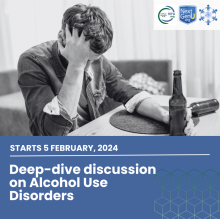Problem
Substance use disorders carry a large burden of disease worldwide across low-, middle- and high-income countries.
Lack of availability and use of relevant, reliable healthcare information is a major contributing factor to suffering and death related to substance use disorders. This applies to all stakeholder groups, including the general public, health workers and policymakers. As a result, many people with substance use disorders do not have access to effective means of prevention and treatment.
Among all stakeholder groups there are widespread misconceptions about substance use disorders, associated with lack of understanding and resulting in stigma and further distress and harm to affected individuals.
Lack of availability and use of reliable healthcare information on substance use disorders is a barrier to global mental health.
How HIFA can help
HIFA is a global health community with more than 20,000 members committed to improve the quality of health care in LMICs. HIFA is uniquely positioned to convene the full range of relevant stakeholders worldwide to explore how to improve the availability and use of healthcare information for substance use disorders in different countries and contexts. This Project supports the HIFA community in a series of discussions over 24 months, to explore in depth issues around how to increase the availability and use of reliable healthcare information on substance use disorders.
Thematic discussion series
We are using the substance type as the basis for our discussions. For each substance type we are exploring the information and learning needs of the general public, health workers and policymakers, introducing cross-cutting themes such as lifespan, socio-ecological, and clinical/public health/policy dimensions as needed.
The series addresses:
1. Tobacco (Dec 2022 - April 2023)
2. Alcohol (Jan 2024 - Feb 2024)
3. Opiates (Oct 2024 - Nov 2024 tbc)
The working group may lead discussion on other substances, such as other psychoactive drugs.
The geographical coverage is global, including both high-income and low- and middle-income countries.
Acknowledgement: We are grateful for sponsorship from the Ulrich and Ruth Frank Foundation for International Health. To learn more about this organization, check out NextGenU.org, where you can access free courses on addiction, public health, medicine, and other health science topics.
Testimonial:
“NextGenU.org is honored to collaborate with HIFA to advance global health. Our Addiction Training for Health Professionals Program provides health professionals with free, high-quality education on addiction prevention, treatment, and recovery worldwide. Working with the HIFA team has significantly enhanced our ability to achieve these goals. Through HIFA's unique approach, we can better address misconceptions, reduce stigma, and improve access to reliable healthcare information for substance use disorders. HIFA's ability to convene diverse stakeholders fosters invaluable discussions and innovations, ultimately enhancing the well-being of individuals worldwide. We proudly support HIFA’s efforts and look forward to continued collaboration.” Miriam Chickering, CEO, June 2024


